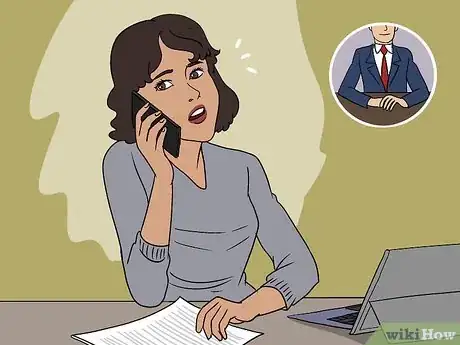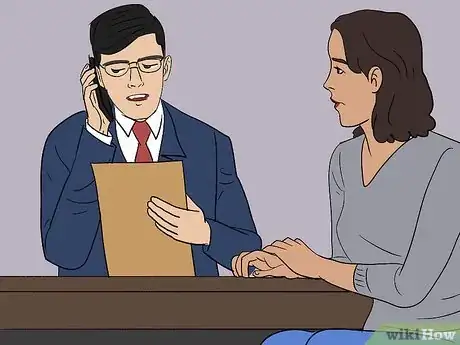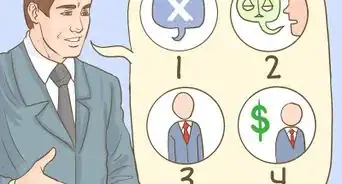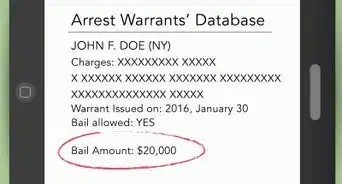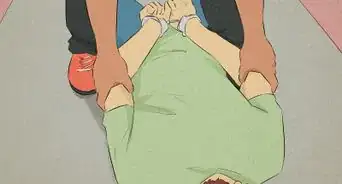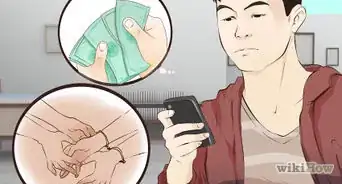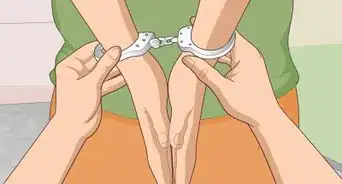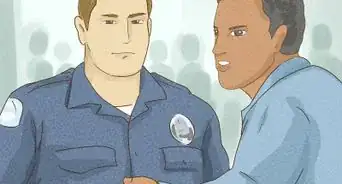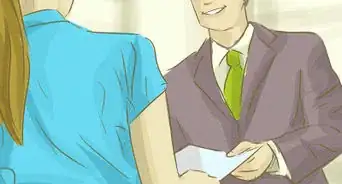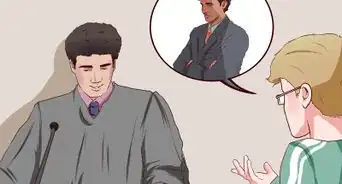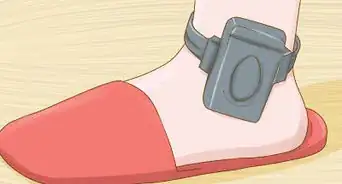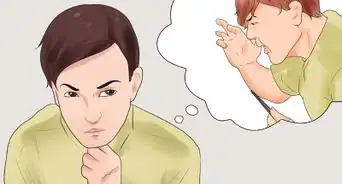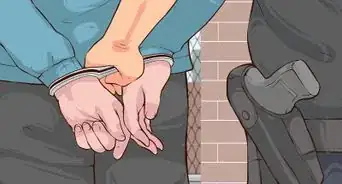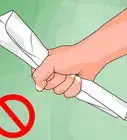This article was co-authored by Clinton M. Sandvick, JD, PhD. Clinton M. Sandvick worked as a civil litigator in California for over 7 years. He received his JD from the University of Wisconsin-Madison in 1998 and his PhD in American History from the University of Oregon in 2013.
There are 11 references cited in this article, which can be found at the bottom of the page.
This article has been viewed 115,846 times.
In the U.S., a judge can issue a warrant for your arrest for many reasons, including criminal activity or failure to appear in court. If you think that there may be an outstanding warrant against you (a warrant that can be used to arrest you at any time), it is very important that you address the situation right away or risk being arrested or detained. In order to respond to an outstanding warrant, it's best to contact an attorney to help you navigate the legal process. Even if the warrant has been outstanding for many years, you could be arrested at any time. This article presents information on dealing with an arrest warrant.
Steps
Determining Whether You Have an Outstanding Warrant
-
1Know what to look for. When dealing with an outstanding warrant, you may be facing either a bench warrant or an arrest warrant. While both warrants require that you be brought to jail, the underlying reasons for the warrants are different.
- A bench warrant is issued by a judge and directs the police to take the person who is named in the warrant into custody and before the court.
- A bench warrant is generally issued because a person failed to appear in court, violated probation, failed to pay a court-ordered fine, or failed to complete community service or pay child support.
- An arrest warrant is typically issued if the police have demonstrated to a judge that they have enough evidence to arrest a person for criminal activity. [1]
-
2Understand the potential consequences for failing to appear in court. For a traffic violation you may have received a notice or summons to appear in court. For a criminal matter you may be expected to appear in court at various stages of a criminal proceeding, including a pre-trial conference, hearing, trial and sentencing. In each instance if you fail to appear, a judge can charge you with a crime such as failure to appear or contempt of court. In addition to the court's issuing a bench warrant directing law enforcement to take you into custody, you may face any of the following:
- If you are found guilty of failing to appear, you can be sentenced to jail or required to pay fines.
- Your driver’s license can be revoked until you appear before the judge.
- You may be required to post bond, or a bond you've posted previously may be revoked. [2]
Advertisement -
3Check for outstanding warrants. If you suspect that a bench warrant or arrest warrant may have been issued for you, you can check for these warrants locally or online by providing the following information: your full name, approximate age, and the place where the warrant was issued. You can actually conduct an online, nationwide warrant search for all cities and states. You can check for outstanding warrants in the following ways:
- If you know the specific courthouse that issued the warrant, go to that court’s website and look for the public records section. You should be able to search for your name there and find information on the warrant.
- You can call your local court and ask the clerk if there is an outstanding warrant. However, there is a chance that your phone call could be traced and used to locate you.
- Similarly, you can call the federal court in the district where you think a warrant may be issued or search that court’s website for outstanding warrants. [3]
- You can find contact information for federal courts at: http://www.uscourts.gov/about-federal-courts/federal-courts-public/court-website-links.
- You can find state-by-state information regarding free warrant searches at: http://publicrecords.onlinesearches.com/Pennsylvania-Warrants.htm
- There are also websites that will run a warrant check on you for a fee. Check for outstanding warrants online at: https://www.dmv.org/warrants.php. They will charge you to generate a report.
-
4Examine information obtained from the warrant check. Once you complete the warrant check, you will want to examine closely all of the information so that you can decide what to do next. The warrant check should provide you with some or all of the following information:
- Date of the offense.
- Date charges were filed.
- The court that issued the warrant.
- The reason the warrant was issued.
- Description of an underlying criminal offense for an arrest warrant.
- The type of case, such as a felony or failure to pay a traffic ticket.
- Any outstanding fines. [4]
Responding to an Outstanding Warrant
-
1Contact a criminal defense attorney immediately. If you know that you have missed a hearing, or your warrant check shows an outstanding warrant, you should contact a criminal defense attorney immediately. An outstanding warrant is a serious matter and not something you should try to handle on your own. An attorney will know the law and pertinent procedures and can advise you on your options. An experienced attorney may be able to:
- Contact the court and arrange to appear for an arraignment rather than surrendering to police custody.
- Schedule a hearing on a bench warrant prior to arrest.
- Arrange to turn yourself in rather than being arrested.
- Determine the amount of any outstanding bond or bond increase. A bond is the amount of money that a person is required to pay to the court to guarantee that they show up for a hearing. [5]
-
2Find out if your local district attorney has an amnesty program. Some DA's run time-limited amnesty programs to resolve outstanding bench warrants. These programs may include the removal of the warrant or associated fees in order to make it easier for people to appear in court to resolve any underlying legal issues. Generally these programs are meant to address warrants for failure to appear for minor offenses such as drinking alcohol in public.
- Check the district attorney’s website for these programs. Your attorney can call the DA’s office to see whether an amnesty program exists. [6]
-
3Contact the court that issued the warrant. Once you have met with your attorney, he or she will contact the court that issued the warrant and verify that it is current and valid. If it is, your attorney will discuss with you the best way to respond.
- In checking the validity of a warrant, your attorney can investigate the possibility that your failure was the result of an error made by the court. The court may have failed to notify you of the date of the hearing or may have changed the date at the last minute. If this is the case, the attorney will argue that the warrant should be recalled and that you should be cleared of any charges or fines related to the bench warrant. [7]
Resolving an Outstanding Warrant
-
1Prepare for your arrest. A court may require that you be arrested before hearing your case on the outstanding warrant. Your attorney will meet with you and discuss the process of being arrested, which may include being fingerprinted and photographed. Your attorney will instruct you not to make any statements to law enforcement or anyone else. Refuse to speak to anyone without your attorney present. [8]
- If you are arrested before you retain an attorney, request one immediately and refuse to answer questions until you speak with one.
-
2Arrange for a bail bondsman. Prior to your arrest your attorney may suggest that you (or the attorney) contact a bail bondsman. If you do not yet know the amount of the bail, your attorney can arrange for a bail bondsman to be present in court. This will allow you to post bail immediately if the judge assigns bail to your case. [9]
- If you live in a state where commercial bail bondsmen are legal, contact one as soon as you know you may need him.
- If you live in Illinois, Kentucky, Oregon, or Wisconsin, or you are in the federal system, the use of commercial bondsmen is outlawed. The practice is rarely used in the District of Columbia, Maine, and Nebraska. [10] If you are in one of these states or the federal system, any bond you are required to pay will go directly to the government. If you cannot afford bail, you will need to have co-signors put money forward on your behalf. [11]
-
3Negotiate the time and place of your surrender. If a court requires that you surrender yourself to the police, rather than attend a court hearing first, your attorney will make arrangements as to the time and place of your surrender to the police. This could spare you the embarrassment of a public arrest and give you time to make the above-mentioned preparations.
- Your attorney can advise you of the best time to turn yourself over to law enforcement in order to minimize jail time before seeing the judge. [12]
-
4Appear in court. In most cases a bench warrant can be resolved only by appearing in the court that issued it. This generally requires that you turn yourself over to law enforcement (after consulting with an attorney). Once you are in custody, a hearing will be set, and you will either be released on bail, released without bail, kept in custody, or required to pay a fine. Once you appear in court and pay any fines or bail, the bench warrant will be recalled and become inactive.
- In determining whether you should be released, a court considers the seriousness of the crime of which you are accused.
- If a bench warrant was issued for failure to pay a ticket, the judge will most likely recall the warrant once you appear in court and pay the ticket and/or fine. [13]
- If you failed to appear at a hearing for a serious crime, the judge may set a high bail or, if you are considered dangerous, may not set bail at all. [14]
- If you have an outstanding arrest warrant and you turn yourself in, you will enter the criminal legal process. You will attend an arraignment hearing during which the judge will determine bail. You may ultimately face a criminal trial.
References
- ↑ http://www.criminaldefenselawyer.com/resources/criminal-defense/defendants-rights/missed-court-warrant.htm
- ↑ http://www.criminaldefenselawyer.com/resources/criminal-defense/defendants-rights/missed-court-warrant.htm
- ↑ http://www.legalmatch.com/law-library/article/how-to-check-for-outstanding-warrants.html
- ↑ http://www.dmv.org/articles/handling-a-warrant-for-your-arrest/
- ↑ http://www.criminaldefenselawyer.com/resources/criminal-defense/defendants-rights/missed-court-warrant.htm
- ↑ http://brooklynda.org/begin-again/
- ↑ https://www.freeadvice.com/legal/turning-yourself-in-for-a-warrant/
- ↑ http://www.emeraldcoastdefense.com/2014/02/24/resolving-an-arrest-warrant-is-a-seven-step-process/
- ↑ https://www.wklaw.com/areas1-recalling-bench-warrant-process.html; http://www.emeraldcoastdefense.com/2014/02/24/resolving-an-arrest-warrant-is-a-seven-step-process/
- ↑ http://www.bjs.gov/content/pub/pdf/prfdsc.pdf
- ↑ http://federaldefendersny.org/information-for-client-and-families/bond-and-pretrial-detention-faqs.html
- ↑ http://www.emeraldcoastdefense.com/2014/02/24/resolving-an-arrest-warrant-is-a-seven-step-process/
- ↑ http://thelawdictionary.org/article/is-there-any-way-to-get-rid-of-a-bench-warrant-if-out-of-state/
- ↑ http://www.emeraldcoastdefense.com/2014/02/24/resolving-an-arrest-warrant-is-a-seven-step-process/
- ↑ http://www.experiencedcriminallawyers.com/criminal-charges/outstanding-warrant/
About This Article
Dealing with an outstanding warrant can be stressful, but the sooner you resolve it, the sooner you’ll be able to put it behind you. After you’ve determined that you have an outstanding warrant, you should contact a criminal defense attorney right away. Remember not to make any statements to the police without your attorney present, as anything you say could be held against you in court. Finally, although it can be nerve-wracking, make sure to show up in court for your hearing, as it will prevent any additional bench warrants. To learn how to contact a bail bondsman, read more from our Civil Litigator co-author.




